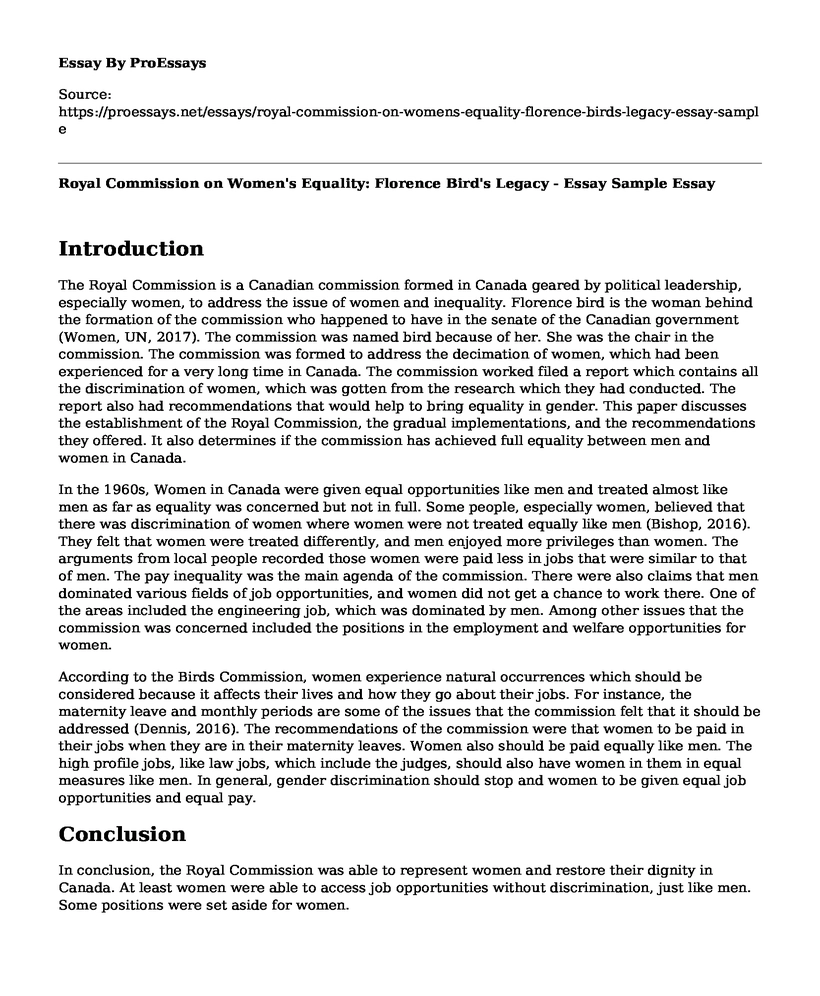Introduction
The Royal Commission is a Canadian commission formed in Canada geared by political leadership, especially women, to address the issue of women and inequality. Florence bird is the woman behind the formation of the commission who happened to have in the senate of the Canadian government (Women, UN, 2017). The commission was named bird because of her. She was the chair in the commission. The commission was formed to address the decimation of women, which had been experienced for a very long time in Canada. The commission worked filed a report which contains all the discrimination of women, which was gotten from the research which they had conducted. The report also had recommendations that would help to bring equality in gender. This paper discusses the establishment of the Royal Commission, the gradual implementations, and the recommendations they offered. It also determines if the commission has achieved full equality between men and women in Canada.
In the 1960s, Women in Canada were given equal opportunities like men and treated almost like men as far as equality was concerned but not in full. Some people, especially women, believed that there was discrimination of women where women were not treated equally like men (Bishop, 2016). They felt that women were treated differently, and men enjoyed more privileges than women. The arguments from local people recorded those women were paid less in jobs that were similar to that of men. The pay inequality was the main agenda of the commission. There were also claims that men dominated various fields of job opportunities, and women did not get a chance to work there. One of the areas included the engineering job, which was dominated by men. Among other issues that the commission was concerned included the positions in the employment and welfare opportunities for women.
According to the Birds Commission, women experience natural occurrences which should be considered because it affects their lives and how they go about their jobs. For instance, the maternity leave and monthly periods are some of the issues that the commission felt that it should be addressed (Dennis, 2016). The recommendations of the commission were that women to be paid in their jobs when they are in their maternity leaves. Women also should be paid equally like men. The high profile jobs, like law jobs, which include the judges, should also have women in them in equal measures like men. In general, gender discrimination should stop and women to be given equal job opportunities and equal pay.
Conclusion
In conclusion, the Royal Commission was able to represent women and restore their dignity in Canada. At least women were able to access job opportunities without discrimination, just like men. Some positions were set aside for women.
References
Women, U. N. (2017). Commission on the Status of Women. Fiftieth Session, 27.
Bishop, O. B. (2016). Canadian Official Publications: Guides to Official Publications. Elsevier.
Denis, A. (2016). Developing a feminist analysis of citizenship of Caribbean immigrant women in Canada: Key dimensions and conceptual challenges. Women, Migration, and Citizenship (pp. 51-74). Routledge.
Cite this page
Royal Commission on Women's Equality: Florence Bird's Legacy - Essay Sample. (2023, Feb 27). Retrieved from https://proessays.net/essays/royal-commission-on-womens-equality-florence-birds-legacy-essay-sample
If you are the original author of this essay and no longer wish to have it published on the ProEssays website, please click below to request its removal:
- Meth Epidemic
- Homeless Veterans
- Social Stratification in Sweet Home Alabama - Research Paper Example
- Alanon Group Meetings Essay
- Research Paper on Racial Discrimination in the Criminal Justice System
- Immigration Reform: A Decade of Debate - Essay Sample
- Essay Example on Addiction Recovery: A Journey to Mental, Physical, and Spiritual Balance







